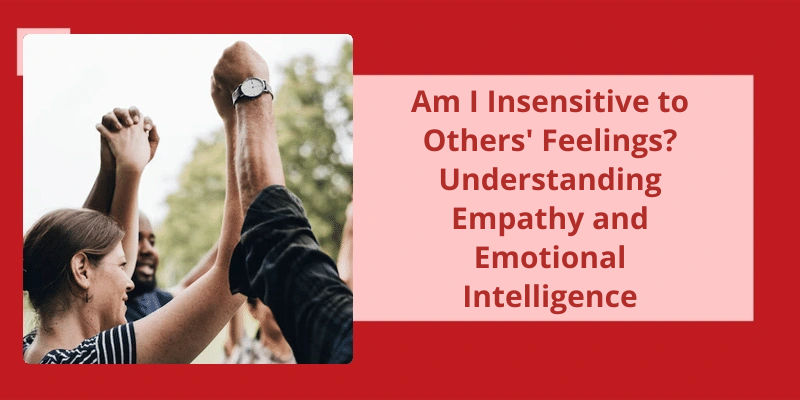Being sensitive to the feelings of others is an important aspect of empathy and social interaction, and being insensitive towards others can lead to a number of negative consequences. It’s easy to become wrapped up in one's own needs and desires, but this can often lead to dismissive or callous behavior towards others. Insensitive people may not take the time to consider how their words or actions affect others, leading to a lack of connection and understanding in their relationships. If you suspect that you may be insensitive towards others, it’s important to examine your own behavior and attitudes, and actively work towards becoming more empathetic and compassionate.
Why Am I So Insensitive to Others?
In many cases, insensitivity may not always be intentional. Individuals who’re insensitive to the feelings of others may have been brought up in an environment that minimizes the importance of emotional awareness. They may not have had a chance to develop emotional intelligence at a young age.
Moreover, insensitive people may struggle with empathy. They could have difficulty putting themselves in someone elses shoes and viewing the world from their perspective. This lack of empathy often stems from a lack of understanding of the depth of emotions and how they’re experienced.
In some cases, insensitivity is used as a form of defense mechanism. Insensitive people may distance themselves from others emotionally as a means of self-protection. This can occur when someone has been emotionally hurt before, and they develop a protective mechanism to distance themselves from others to avoid being hurt again.
However, being insensitive can cause serious difficulties in social situations. Dependence on emotional detachment can make people appear cold and unfeeling, and therefore unapproachable. Insensitive persons may also be dismissive of the concerns of others, which can create problems in personal and professional relationships.
Finally, sensitive individuals tend to have more meaningful and deep connections with others, which ultimately increases their sense of belonging and satisfaction in relationships. In contrast, insensitive people may lack intimacy and unconditional love in their personal relationships, which can ultimately lead to feelings of loneliness and isolation.
Understanding the reasons why one may exhibit insensitivity to others is the first step in learning how to overcome it. Insensitivity is rooted in many different factors, but being open to understanding how ones experiences have influenced their sensitivity can help them develop empathy and emotional intelligence. With practice, individuals can learn to be more sensitive to the emotions of others and ultimately foster deeper, meaning relationships.
The Importance of Validating Others’ Emotions
- Validating others’ emotions shows that you care
- It helps to build trust and establish stronger relationships
- Validating emotions can de-escalate potentially volatile situations
- It allows individuals to feel heard and understood
- Validating emotions can lead to greater empathy and compassion
- It can encourage open and honest communication
Why Do I Come Off as Insensitive?
This can leave others feeling the brunt of your apathy and lead to misinterpretations of your true feelings. It may seem easier to avoid emotional situations altogether, but it can have consequences that ultimately hurt your relationships. Being open and empathetic to others doesn’t make you weak – it makes you human.
Another reason you may come off as insensitive is that you prioritize logic over emotion. While it’s important to be rational and make logical decisions, it’s also important to consider how others feel. Talking through problems with loved ones and considering their perspective is essential to building strong relationships. By focusing solely on the facts, you may inadvertently neglect the emotional impact of your words or actions. Recognizing the importance of emotions and actively working to incorporate them into your decision-making process can help you come off as more compassionate and understanding.
It’s also possible that your past experiences have led you to build emotional walls. Maybe youve been hurt or disappointed in the past and have developed a coping mechanism of distancing yourself from emotional situations. While understandable, this approach can backfire and leave you feeling disconnected from those closest to you. By taking small steps to open yourself up to vulnerability and sharing your emotions with others, you may find that you can build stronger, more meaningful relationships.
Furthermore, you may simply not recognize when others are struggling emotionally. This can happen when youre preoccupied with your own thoughts or responsibilities and fail to notice the nonverbal cues others are giving off. Being unaware of others emotions can cause you to inadvertently act insensitively, so it’s important to stay present and attentive to those around you. Checking in with loved ones regularly and actively listening to their concerns can help prevent misunderstandings.
Lastly, it’s possible that coming off as insensitive is simply a matter of communication style. Perhaps you’ve a more straightforward or blunt way of speaking that can come across as brusque or insensitive. While it’s important to be honest and direct in your communication, it’s equally important to consider how your words might be received by others. Learning to communicate with empathy and tact can help you convey your message effectively without causing unintentional harm.
By recognizing and addressing your emotional blind spots, you can build stronger and more meaningful connections with those around you.
The Impact of Stress and Burnout on Our Ability to Be Empathetic and Emotionally Sensitive
- Stress can lead to emotional exhaustion and a decreased ability to empathize with others.
- Burnout can result in feelings of detachment and cynicism, making it difficult to connect with others on an emotional level.
- Both stress and burnout can contribute to a reduced capacity for emotional sensitivity and can make it challenging to respond to others’ emotions effectively.
- It’s important to address stress and burnout to prioritize our mental health and maintain our ability to empathize and connect with others.
Source: Why am I insensitive?..
It’s important to recognize that unintentional insensitivity can happen to anyone, regardless of their intentions or beliefs. In today’s world, where social justice issues are at the forefront, it’s crucial to be mindful of our actions and words to avoid causing harm to others. In this article, we’ll explore the different ways we might unknowingly hurt others and how we can work towards being more empathetic and considerate individuals.
Can You Be Unintentionally Insensitive?
It’s important to note that being unintentionally insensitive doesn’t make someone a bad person. We can all learn from our mistakes and make a conscious effort to be more considerate in the future. It’s a natural part of being human to make mistakes, especially when it comes to our interactions with others.
In many cases, unintentional insensitivity might stem from a lack of awareness about how certain words or actions might be perceived by others. This is particularly true when it comes to issues of race, gender, sexuality, and other sensitive topics. Often, people may think they’re being inclusive or understanding, when in fact their words or actions are coming across as insensitive or even offensive.
While this might seem like a minor thing, it can be incredibly frustrating for the people on the receiving end, and can make them feel like their opinions don’t matter.
Another example might be someone who assumes that everyone else shares their beliefs or values, and makes insensitive comments about people who don’t fit into their worldview. For example, someone might assume that everyone is heterosexual and make insensitive comments about homosexuality, not realizing that they’re offending people who identify as LGBTQ+.
It’s also possible to unintentionally offend someone simply by not being aware of their cultural background or experiences. For example, someone might make a joke that’s perfectly acceptable in their own culture, but which comes across as insensitive or offensive to someone from a different background.
By being mindful of our interactions with others, we can avoid causing unintentional offense, and build stronger, more respectful relationships with everyone in our lives.
Many of us struggle with being insensitive towards others, often unintentionally. It can negatively affect our relationships and overall well-being. However, there are ways to become more empathetic and considerate towards those around us. By building emotional regulation skills, practicing mindfulness, journaling about our feelings, not taking things personally, accepting ourselves, and learning to tolerate distress, we can become more sensitive individuals.
How Do I Stop Being Insensitive to Others?
Being insensitive to others can be detrimental to personal and professional relationships. It can result in misunderstandings, conflicts, and hurt feelings. However, it’s possible to become less insensitive by building emotional regulation skills. Emotional regulation is the ability to manage and control ones emotions in a healthy way. It’s a skill that can be learned and developed through practice.
Mindfulness is the practice of being present in the moment and non-judgmentally observing ones thoughts and emotions. It can help individuals become more aware of their emotional reactions and respond to situations in a more balanced way. By practicing mindfulness regularly, individuals can become more sensitive to their own emotions and the emotions of others.
Another helpful tool for becoming less insensitive is journaling. Writing about ones feelings and experiences can help individuals gain insight into their emotional reactions and identify patterns of behavior that may contribute to insensitivity. Journaling can also provide a safe space for exploring and processing difficult emotions.
It’s also important not to take things personally. This can be difficult, especially when someone elses actions or words feel hurtful or insulting. However, it’s important to remember that everyone has their own baggage and insecurities that may influence their behavior. By not taking things personally, individuals can avoid unnecessary conflicts and develop a thicker skin.
Accepting oneself for who they’re is also an important step in becoming less insensitive. When individuals are comfortable with themselves, they’re better able to empathize with others and recognize their emotions. It’s important to remember that no one is perfect and that everyone has their own strengths and weaknesses.
Finally, becoming better at tolerating distress can also help individuals become less insensitive. Life is full of challenges and difficulties, and it’s important to learn how to cope with them in a healthy way. By developing healthy coping mechanisms such as exercise, meditation, or talking with a trusted friend or therapist, individuals can become more resilient and better able to handle stress without becoming negatively affected by it.
The Role of Empathy in Reducing Insensitivity
Empathy, or the ability to understand and share the feelings of others, plays a crucial role in reducing insensitivity. When we’re able to put ourselves in someone else’s shoes, we develop a greater appreciation for their experiences and emotions. This helps us to become more aware of how our actions and words can impact others, and to be more thoughtful and considerate in our interactions. By fostering empathy, we can create a more compassionate and caring society where people are better equipped to understand and respect one another.
Other factors that can contribute to emotional sensitivity include hormonal changes, medication side effects, and medical conditions such as anxiety or depression. In any case, understanding the root cause of your emotional sensitivity can help you better manage your feelings and improve your overall well-being. Let’s explore some tips on how to do just that.
Why Am I So Sensitive Emotionally?
They’re wired to feel things deeply and have a heightened sense of empathy towards others. This can be both a blessing and a curse, as it allows them to connect with others on a deeper level, but it can also lead to feeling overwhelmed by the emotions of others. Additionally, certain life experiences such as childhood trauma or abuse can also contribute to emotional sensitivity later in life.
Another factor that may contribute to emotional sensitivity is hormonal imbalances. For example, women may feel more emotional during certain times of the month due to fluctuations in their hormones. Additionally, certain medical conditions such as thyroid disorders or depression can also impact emotional sensitivity.
It’s important to note that being emotionally sensitive isn’t necessarily a bad thing. In fact, it can be a sign of emotional intelligence and can allow for deeper connections with others. However, it can also be difficult to navigate in a world that often values stoicism and emotional detachment.
If you find that your emotional sensitivity is impacting your daily life and relationships, it may be helpful to seek support from a therapist or counselor. They can help you develop coping strategies and work through any underlying issues that may be contributing to your emotional sensitivity.
It’s important to approach it with empathy and understanding, both for yourself and others who may be grappling with similar struggles. Remember that it’s okay to feel deeply and that you aren’t alone in your experiences.
How to Cope With Emotional Sensitivity in the Workplace and Other Social Settings.
- Take breaks when needed to process emotions
- Practice deep breathing and meditation
- Communicate boundaries with coworkers
- Seek support from a therapist or counselor
- Engage in stress-reducing activities outside of work
- Identify triggers and find ways to avoid or manage them
- Use positive self-talk and practice self-compassion
- Consider disclosing your sensitivity with trusted coworkers or supervisors
Conclusion
Recognizing and addressing our own insensitivity is crucial to building healthy relationships and fostering empathy. By actively striving to understand and prioritize the emotions of those around us, we can develop a deeper sense of compassion and connection with those we interact with. It’s important to continually self-reflect and challenge our own biases and tendencies towards insensitivity in order to cultivate a more empathetic and understanding approach towards others.






